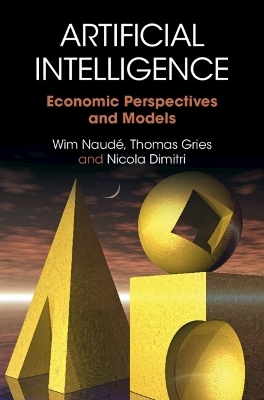
Artificial Intelligence
Cambridge University Press (Verlag)
978-1-009-48308-7 (ISBN)
Is Artificial Intelligence a more significant invention than electricity? Will it result in explosive economic growth and unimaginable wealth for all, or will it cause the extinction of all humans? Artificial Intelligence: Economic Perspectives and Models provides a sober analysis of these questions from an economics perspective. It argues that to better understand the impact of AI on economic outcomes, we must fundamentally change the way we think about AI in relation to models of economic growth. It describes the progress that has been made so far and offers two ways in which current modelling can be improved: firstly, to incorporate the nature of AI as providing abilities that complement and/or substitute for labour, and secondly, to consider demand-side constraints. Outlining the decision-theory basis of both AI and economics, this book shows how this, and the incorporation of AI into economic models, can provide useful tools for safe, human-centered AI.
Wim Naudé is an economist, author, and entrepreneur. He has held appointments at Oxford University and the United Nations University (UNU) and has been a visiting faculty member at Brown University's Brown International Advanced Research Institutes. He has published widely in scientific journals, and has authored and edited books published by Palgrave Macmillan, Oxford University Press, and Routledge. He is ranked by Stanford University /Elsevier amongst the top 2 percent of scientists in the world. Thomas Gries studied economics at Göttingen and the University of California. He received his Ph.D. at Kiel University. He also was a visiting scholar at UNU World Institute for Development Economics Research in Helsinki. Currently he is Professor for International Growth at Paderborn University, Germany. His research is highly interdisciplinary and covers a large variety of topics, such as economic growth and development up to and conflict economics. Nicola Dimitri is a professor of economics, former deputy rector and acting rector at the University of Siena, Italy. He has published widely in international journals and edited three books, including the 'Handbook of Procurement' (2006) for Cambridge University Press. His main interests are in game theory, AI and economics, and blockchain and cryptocurrencies.
1. Introduction; 2. Artificial Intelligence and economics: a gentle introduction; 3. Artificial Intelligence and the economics of decision-making; 4. Artificial Intelligence in the production factor; 5. Artificial Intelligence, growth and inequality; 6. Investing in Artificial Intelligence: breakthroughs and backlashes; 7. Artificial Intelligence arms races as innovation contests; 8. Directing Artificial Intelligence innovation and diffusion; 9. Artificial Intelligence, big data and public policy; 10. The future of Artificial Intelligence and implications for economics.
| Erscheinungsdatum | 18.05.2024 |
|---|---|
| Zusatzinfo | Worked examples or Exercises |
| Verlagsort | Cambridge |
| Sprache | englisch |
| Themenwelt | Informatik ► Theorie / Studium ► Künstliche Intelligenz / Robotik |
| Wirtschaft ► Volkswirtschaftslehre ► Makroökonomie | |
| ISBN-10 | 1-009-48308-0 / 1009483080 |
| ISBN-13 | 978-1-009-48308-7 / 9781009483087 |
| Zustand | Neuware |
| Informationen gemäß Produktsicherheitsverordnung (GPSR) | |
| Haben Sie eine Frage zum Produkt? |
aus dem Bereich


